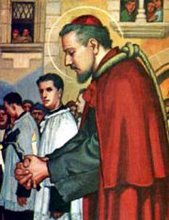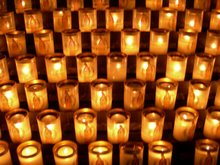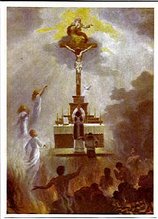
Question: What happens to people who have committed suicide? Have you ever been visited by these people?
Answer: Up to now, I have never encountered the case of a suicide who was lost — this doesn't mean, of course, that that doesn't exist — but often, the souls tell me that the most guilty were those around them, when they were negligent or spread calumny.
At this moment, I asked Maria if the souls regretted having committed suicide. She answered yes. Often, suicide is due to illness. These souls do regret their act because, as they see things in the light of God, they understand instantly all the graces that were in store for them during the time remaining for them to live — and they do see this time which remained for them, sometimes months or years —– and they also see all the souls they could have helped by offering the rest of their lives to God. In the end, what hurts them most is to see the good that they could have done but didn't, because they shortened their lives. But when the cause is illness, the Lord takes this into account, of course.
Question: Are there priests in Purgatory?
Answer: Yes, there are many. They didn't promote respect for the Eucharist. So Faith overall suffers. They are often in Purgatory for having neglected prayer — which has diminished their Faith. But there are also many who have gone straight to Heaven.
Question: What would you say, then, to a priest who really wants to live according to the Heart of God?
Answer: I would advise him to pray much to the Holy Spirit — and to say his Rosary every day.
Question: Have you been visited by souls who, on earth, practiced perversions? I am thinking, for example, about the sexual domain.
Answer: Yes, they are not lost, but they have much to suffer to be purified. For example: homosexuality. This truly comes from the Evil One.
Question: What advice would you give, then, to all those people afflicted by homosexuality, with this tendency in them?
Answer: Pray a lot for the strength to turn away from it. They should above all pray to the Archangel Michael; he is the great fighter par excellence against the Evil One.
Question: What are the attitudes of heart which can lead us to losing our soul for good, I mean going to Hell?
Answer: It is when the soul does not want to go towards God, when it actually says: "I do not want."
Question: Jesus said that it was difficult for a rich person to enter into the Kingdom of Heaven. Have you seen such cases?
Answer: Yes! But if they do good works, works of charity, if they practice love, they can get there, just like the poor.
Question: What do you think of the practices of spiritism? For example: calling up the spirits of the departed, Ouija-boards, etc.?
Answer: It is not good. It is always evil. It is the devil who makes the table move.
Question: What is the difference between what you are living with the souls of the departed, and the practices of spiritism?
Answer: We are not supposed to summon up the souls — I don't try to get them to come. In spiritism, people try to call them forth.
This distinction is quite clear, and we must take it very seriously. If people were only to believe one thing I have said, I would like it to be this: those who engage in spiritism (moving tables and other practices of that kind) think that they are summoning up the souls of the dead. In reality, if there is some response to their call, it is always and without exception Satan and his angels who are answering. People who practice spiritism (diviners, witches, etc.) are doing something very dangerous for themselves and for those who come to them for advice. They are up to their necks in lies. It is forbidden, strictly forbidden, to call up the dead. As for me, I have never done so, l do not do so, and I never will do so. When something appears to me, God alone permits it.
Answer: Up to now, I have never encountered the case of a suicide who was lost — this doesn't mean, of course, that that doesn't exist — but often, the souls tell me that the most guilty were those around them, when they were negligent or spread calumny.
At this moment, I asked Maria if the souls regretted having committed suicide. She answered yes. Often, suicide is due to illness. These souls do regret their act because, as they see things in the light of God, they understand instantly all the graces that were in store for them during the time remaining for them to live — and they do see this time which remained for them, sometimes months or years —– and they also see all the souls they could have helped by offering the rest of their lives to God. In the end, what hurts them most is to see the good that they could have done but didn't, because they shortened their lives. But when the cause is illness, the Lord takes this into account, of course.
Question: Are there priests in Purgatory?
Answer: Yes, there are many. They didn't promote respect for the Eucharist. So Faith overall suffers. They are often in Purgatory for having neglected prayer — which has diminished their Faith. But there are also many who have gone straight to Heaven.
Question: What would you say, then, to a priest who really wants to live according to the Heart of God?
Answer: I would advise him to pray much to the Holy Spirit — and to say his Rosary every day.
Question: Have you been visited by souls who, on earth, practiced perversions? I am thinking, for example, about the sexual domain.
Answer: Yes, they are not lost, but they have much to suffer to be purified. For example: homosexuality. This truly comes from the Evil One.
Question: What advice would you give, then, to all those people afflicted by homosexuality, with this tendency in them?
Answer: Pray a lot for the strength to turn away from it. They should above all pray to the Archangel Michael; he is the great fighter par excellence against the Evil One.
Question: What are the attitudes of heart which can lead us to losing our soul for good, I mean going to Hell?
Answer: It is when the soul does not want to go towards God, when it actually says: "I do not want."
Question: Jesus said that it was difficult for a rich person to enter into the Kingdom of Heaven. Have you seen such cases?
Answer: Yes! But if they do good works, works of charity, if they practice love, they can get there, just like the poor.
Question: What do you think of the practices of spiritism? For example: calling up the spirits of the departed, Ouija-boards, etc.?
Answer: It is not good. It is always evil. It is the devil who makes the table move.
Question: What is the difference between what you are living with the souls of the departed, and the practices of spiritism?
Answer: We are not supposed to summon up the souls — I don't try to get them to come. In spiritism, people try to call them forth.
This distinction is quite clear, and we must take it very seriously. If people were only to believe one thing I have said, I would like it to be this: those who engage in spiritism (moving tables and other practices of that kind) think that they are summoning up the souls of the dead. In reality, if there is some response to their call, it is always and without exception Satan and his angels who are answering. People who practice spiritism (diviners, witches, etc.) are doing something very dangerous for themselves and for those who come to them for advice. They are up to their necks in lies. It is forbidden, strictly forbidden, to call up the dead. As for me, I have never done so, l do not do so, and I never will do so. When something appears to me, God alone permits it.
(source: The Amazing Secret of the Souls in Purgatory, published by Queenship Publishing Co)















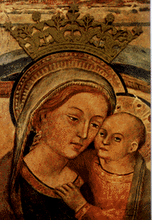






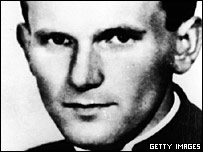

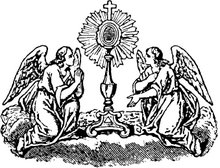
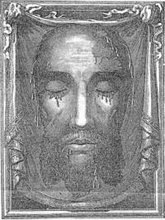







01.jpg)


